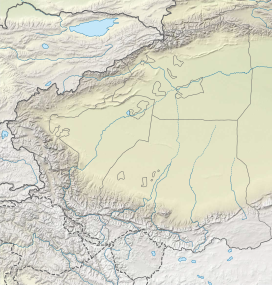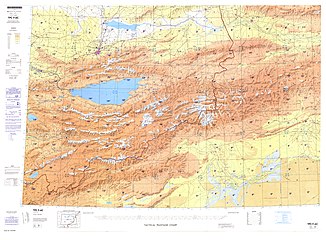Bedel Pass
| Bedel Pass | |
|---|---|
| Elevation | 4,284 metres (14,055 ft) |
| Location | Kyrgyzstan and Xinjiang, China |
| Range | Tian Shan Mountains |
| Coordinates | 41°24′30″N 78°24′30″E / 41.4083°N 78.4083°E |
 | |
| Bedel Pass | |||||||
|---|---|---|---|---|---|---|---|
| Traditional Chinese | 別迭里山口 | ||||||
| Simplified Chinese | 别迭里山口 | ||||||
| Literal meaning | Bedel pass | ||||||
| |||||||
| Alternative Chinese name | |||||||
| Traditional Chinese | 勃達嶺 | ||||||
| Simplified Chinese | 勃达岭 | ||||||
| Literal meaning | Bedel ridge | ||||||
| |||||||
| Second alternative Chinese name | |||||||
| Traditional Chinese | 撥達嶺 | ||||||
| Simplified Chinese | 拨达岭 | ||||||
| Literal meaning | Bedel ridge | ||||||
| |||||||
Bedel Pass (Kyrgyz: Бедел ашуусу, بەدەل اشۇۇسۇ; Uyghur: بەدەل ئېغىزى; Chinese: 别迭里山口[1]) is a mountain pass in the Tian Shan Mountains range between Kyrgyzstan and China's Xinjiang. It has an elevation of 4,284 meters (14,055 ft).[1] The pass linked China to Barskon, a settlement on the southern shore of lake Issyk-kul.
History
[edit]Historically, the Bedel Pass served as a Silk Road trade route between China and Central Asia. On the Chinese side, the Bedel Beacon Tower (別迭里烽燧) is located on the foothills along the path. It was built during the Han dynasty as part of the Han Great Wall. The beacon was reused and renovated during the Tang dynasty.[2] During the Sui and Tang dynasties, the pass was the main trade route linking Tarim Basin and Western Turks in Central Asia.
A number of scholars argue that Chinese explorer Xuanzang who inspired the Chinese classic Journey to the West used this pass in the 7th century on his journey to India.[3][4] The name Xuanzang used for the passage was "凌山", it was said to be northwest of "Kingdom of Baluka",[5] modern day city of Aksu.[6] However, others argue that was Muzart Pass.[4]
The pass was surveyed in 1881 by both Chinese and Russian counterparts as part of Protocol of Chuguchak of 1864 demarcating the border in the region between the Russian Empire and the Qing dynasty.[7] During the Urkun incident of 1916, over 100,000 Kyrgyz reportedly died fleeing from Tsarist forces they attempted to reach China through the Bedel Pass.[8]
The pass is currently closed to traffic.[9] Kumtor Gold Mine is located down the road on the Kyrgyz side.[10] Along the path on the Chinese side is also the ruins of a KMT era sentry post which is a local cultural heritage site.[11][12]
Historical maps
[edit]Historical maps of the region including Bedel Pass:
-
Map including Bedel Pass (labeled as Pereval Bedel'[13])
See also
[edit]References
[edit]- ^ a b [China-Kyrgyzstan Border Agreement] (in Chinese). 1996-07-04 – via Wikisource.
别迭里山口(原苏联地图为4284.0米别迭里山口)
- ^ "别迭里烽燧:古丝绸之路上的驿站" [Bedel Beacon: A relay on the ancient Silk Road]. 远方的家. Season 长城内外. Episode 194 (in Chinese). 2016-07-21. China Central Television. Retrieved 2017-02-01.
- ^ Wang, Zhihong (2006). Dust in the Wind: Retracing Dharma Master Xuanzang's Western Pilgrimage. Rhythms Monthly. p. 80. ISBN 9789868141988.
He then traveled southwest via the Bedel Pass, 4,284 meters above sea level. During the Sui and Tang Dynasties, this was the main mountain pass linking Western Turks and the kingdoms located in the Tarim Basin.
- ^ a b E.J. van Donzel; Andrea Schmidt (17 May 2010). Gog and Magog in Early Eastern Christian and Islamic Sources: Sallam's Quest for Alexander's Wall. BRILL. pp. 248–249. ISBN 978-90-474-2762-9.
Xuanzang could have attacked the mountain ... where the road to Kuldja leads to the 'Muzart Art' or Icy Pass ... Chavannes and Smith, however, are of the opinion that Xuanzang took the Bedel Pass.
- ^ Xuanzang. [Kingdom of Baluka]. Great Tang Records on the Western Regions (in Chinese). Vol. 1 – via Wikisource.
- ^ John E. Hill (July 2003). "Section 20 – The Kingdom of Suoche 莎車 (Yarkand).". Notes to The Western Regions according to the Hou Hanshu (2nd ed.). Washington University. Retrieved 3 February 2020.
Neolithic artefacts from 5000 BC have been discovered in the Aksu area. By the first century BC news had reached the Chinese imperial court of the Kingdom of Baluka, one of the 36 kingdoms of the Western Regions.
- ^ "The Lost Frontier – Treaty Maps that Changed Qing's Northwestern Boundaries_Demarcating and Signposting". National Palace Museum. Retrieved 2017-02-01.
...a joint survey of the borders from Bedel daban to Uz-bel.
- ^ Pannier, Bruce (2006-08-02). "Kyrgyzstan: Victims Of 1916 'Urkun' Tragedy Commemorated". RFE/RL. Retrieved 2006-08-02.
- ^ "Barskoon". visitkarakol.com. Retrieved 2017-02-01.
...passing over the Bedel Pass (4,284 m) into China (the section from Kara-Say to Bedel Pass is now closed).
- ^ "Bedel Pass". dangerousroads.org. Retrieved 2017-02-01.
It is now the main road leading to the Kumtor Gold mine
- ^ Urumqi Tourism Bureau (2014-09-18). "大美新疆之旅游篇—克孜勒苏". urumqitour.gov.cn (in Chinese). Retrieved 2017-02-03.
别迭里古道旁的依不拉音古堡
[permanent dead link] - ^ 依不拉依木二道卡子. Silk Road GIS (silkroad.fudan.edu.cn) (photograph) (in Chinese). Fudan University. Retrieved 2017-02-03.
县级重点文物保护单位 依不拉伊木二道卡子 乌什县人民政府二〇一〇年六月三日公布 乌什县人民政府二〇一二年五月三十日立
- ^ Pereval Bedel’ (Approved - N) at GEOnet Names Server, United States National Geospatial-Intelligence Agency



![Map including Bedel Pass (labeled as Pereval Bedel'[13])](http://upload.wikimedia.org/wikipedia/commons/thumb/9/93/A-k%60o-su_NK-44_%281950%29_-_panoramio.jpg/230px-A-k%60o-su_NK-44_%281950%29_-_panoramio.jpg)

